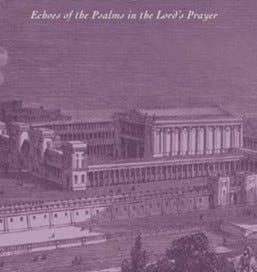Hallowed: Echoes of the Psalms in the Lord’s Prayer
Reuben Bredenhof.
Hallowed: Echoes of the Psalms in the Lord’s Prayer.
Eugene: Wipf and Stock, 2019 (119 pages).
Reviewed by Dr. Jill Firth
Reuben Bredenhof is pastor of the Mt Nasura Free Reformed Church in Western Australia. He has previously served Canadian Reformed churches and is currently preparing to take up a role as Professor of Ministry and Mission at the Canadian Reformed Theological Seminary in Ontario. Bredenhof holds a PhD from St Mary’s University in Twickenham on the parable of the rich man and Lazarus, published as Failure and Prospect (LNTS, 2020). He has also written on the commandments and Proverbs (Wipf and Stock, 2018), and on developing a Christ-shaped ministry (Reformation Heritage Books, 2021).
In Hallowed, Bredenhof explains that Jesus ‘mined many themes and phrases directly from the prayers of the Psalms’ in teaching the Lord’s Prayer. Chapter 1, ‘I Call Upon You,’ draws on Psalm 86 to give some preliminary advice on prayer, including praying with expectation and humility. Chapter 2, ‘My Father in Heaven,’ focuses on God’s royal majesty in Psalm 103 before exploring the concept of God’s fatherhood across the Old Testament, including in Psalms 68 and 103. A further discussion examines the deepening of this concept in the New Testament. Chapter 3, ‘Glory to God’ describes God’s glory, then his holiness, referring to Psalms 19 and 29. Chapter 4, ‘Bow Before Christ the King,’ considers Psalm 72, a royal psalm which focuses on righteousness, justice, and peace, and the blessing which flows from true kingship. The discussion then turns to our own submission to Christ the King, who fulfils all the petitions of Psalm 72. In Chapter 5, ‘Teach Me Your Paths,’ Bredenhof uses Psalm 25 to highlight David’s desire to know God’s will, giving insight to Jesus’ prayer, ‘Your will be done.’ Chapter 6, ‘The Fountain of Blessing,’ offers Psalm 65 as a model for gratitude, before discussing expectant petition. Chapter 7, ‘Forgiven and Changed,’ uses Psalms 51 and 32 to explore repentance and forgiveness. Chapter 8, ‘The War Prayer,’ describes spiritual warfare using Psalm 35, before reminding us of the armour provided in Ephesians 6. Chapter 9, ‘A Finale of Prayer and Confidence,’ notes the use of doxologies in Psalms 41 and 147. The Lord’s Prayer directs our attention back to God in the final words. The Conclusion, ‘Pray Without Ceasing,’ explains that though we do need to work, eat, and sleep, we can ‘saturate our days with prayer.’ Bredenhof reminds us that answers may be slow in coming, but ‘[T]he heart of prayer is not what we get, but who we get.’ Prayer deepens our relationship with God and with his son, Jesus Christ.
Hallowed developed from a series of sermons at the Mt Nasura Church. It is a short and readable book, devotional and thematic in nature, which focuses on learning about prayer and practically applying each topic. The book could be valuable as a sourcebook for pastors considering teaching the Lord’s Prayer, or for anyone who wishes to pray the Lord’s Prayer. Study questions accompanying each chapter also make the book suitable for use by study groups, or in personal devotion.
Revd Dr Jill Firth is Lecturer in Hebrew and Old Testament at Ridley College, Melbourne.




